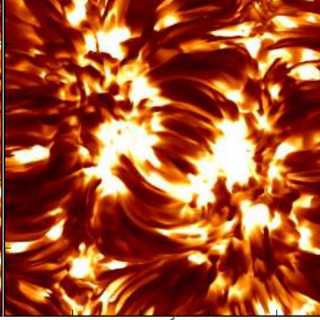Bibcode
Carlin, E. S.; Asensio Ramos, A.
Referencia bibliográfica
The Astrophysical Journal, Volume 801, Issue 1, article id. 16, 15 pp. (2015).
Fecha de publicación:
3
2015
Revista
Número de citas
28
Número de citas referidas
20
Descripción
This paper presents a synthetic tomography of the quiet solar
chromosphere formed by spatial maps of scattering polarization. It has
been calculated for the Ca II 8498, 8542, and 3934 Å lines by
solving the non-LTE radiative transfer problem of the second kind in a
three-dimensional atmosphere model obtained from realistic
magneto-hydrodynamical simulations. Our investigation focuses on the
linear polarization signals induced by kinematics, radiation field
anisotropy, and the Hanle effect in forward-scattering geometry. Thus,
instead of considering slit profiles at the limb as normally done in the
study of the second solar spectrum, we synthesize and analyze spatial
maps of polarization at the disk center. This allows us to understand
the spatial signatures of dynamics and magnetic field in the linear
polarization in order to discriminate them observationally. Our results
suggest some ideas for chromospheric diagnosis that will be developed
throughout a series of papers. In particular, Hanle polarity inversion
lines and dynamic Hanle diagrams are two concepts introduced in the
present work. We find that chromospheric dynamics and magnetic field
topology create spatial polarization fingerprints that trace the dynamic
situation of the plasma and the magnetic field. This allows us to
reconstruct the magnetic field intensity in the middle chromosphere
using Stokes V along grooves of null linear polarization. We finally
address the problems of diagnosing Hanle saturation and kinematic
amplification of scattering signals using Hanle diagrams.
Proyectos relacionados

Magnetismo, Polarización y Transferencia Radiativa en Astrofísica
Los campos magnéticos están presentes en todos los plasmas astrofísicos y controlan la mayor parte de la variabilidad que se observa en el Universo a escalas temporales intermedias. Se encuentran en estrellas, a lo largo de todo el diagrama de Hertzsprung-Russell, en galaxias, e incluso quizás en el medio intergaláctico. La polarización de la luz
Tanausú del
Pino Alemán